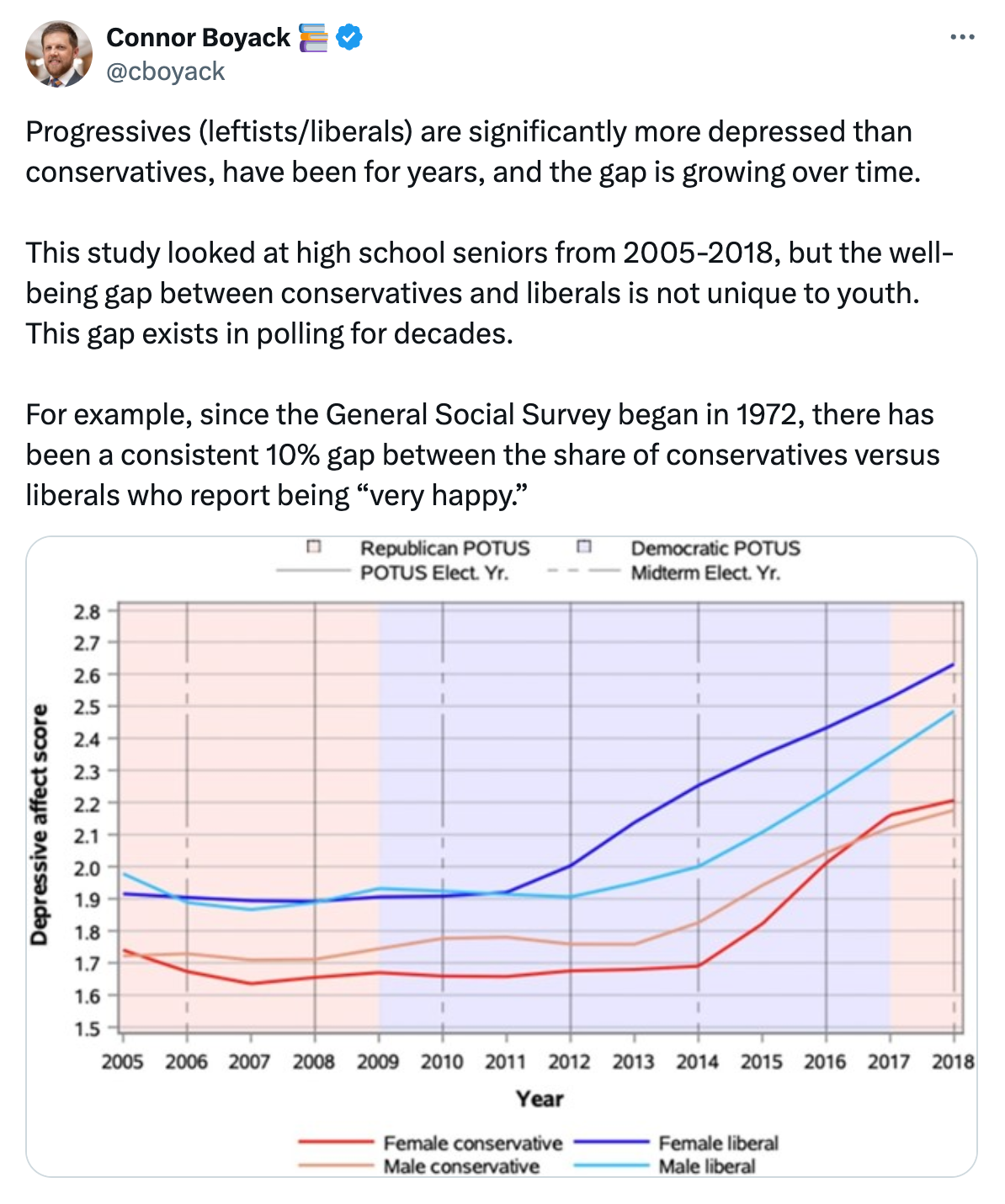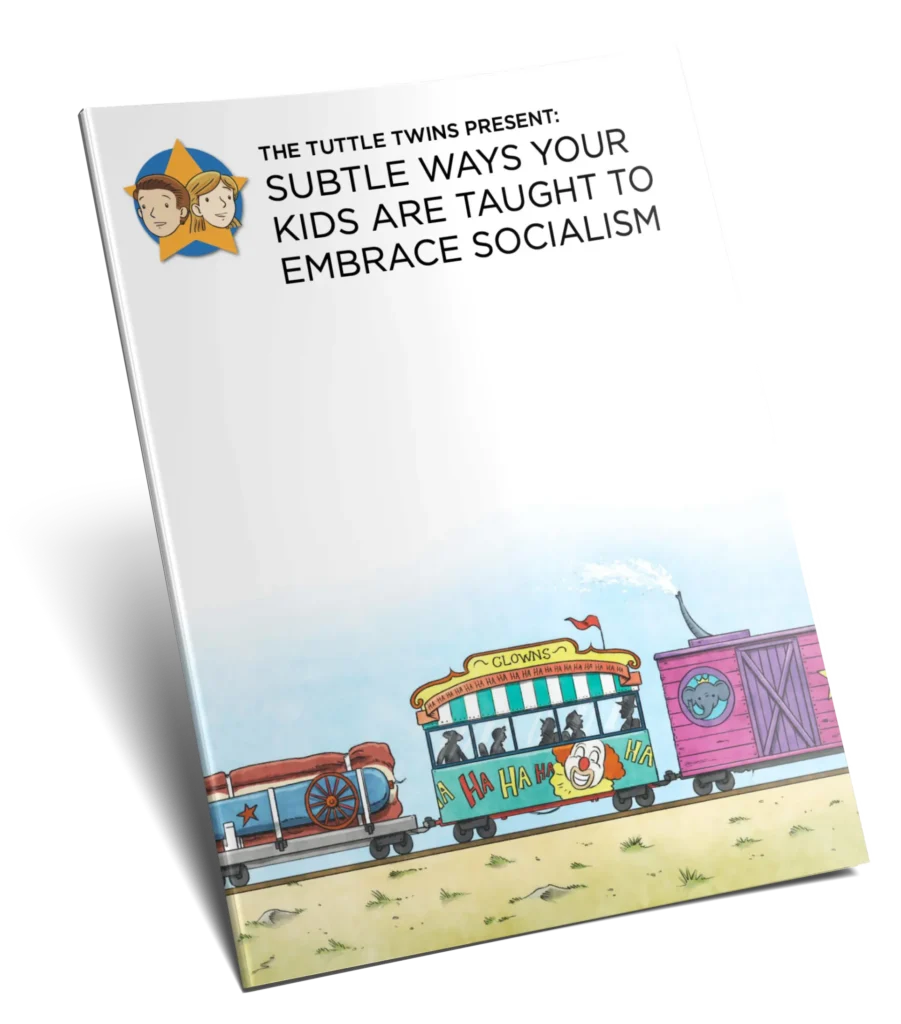
I went down a bit of a rabbit hole last week, and want to share some of what I learned.
Have you noticed how people who would identify as “conservative” often seem happier than their progressive or liberal counterparts?
I have. So I decided to go digging.
And as it turns out, this observation isn’t just anecdotal—it’s backed by decades of research.
Since the 1970s, surveys have consistently shown a significant happiness gap between conservatives and liberals, with conservatives reporting higher levels of life satisfaction.
And the gap is growing.
Of particular interest is a study that took a close look at high school seniors from 2005 to 2018. The results were eye-opening.
It showed that conservative teens are significantly less likely to be depressed than their liberal peers.

This trend really took off around 2011 and it has been widening ever since.
So, what’s driving the divide?
An entire book could be written about it (*adds to my list of book ideas*) but if I were to super over-simplify, I’d say it boils down to a few key factors.
Conservatives generally hold values like personal responsibility, hard work, and merit in high regard. They believe in their own ability to shape their lives, which leads to a sense of control and purpose.
When you know your efforts can lead to real results, it’s easier to feel content, hopeful, and fulfilled.
On the flip side, there’s a growing trend on the left to focus heavily on so-called “systemic issues” like inequality and oppression. It doesn’t take a PhD to understand that constantly fixating on how you’ve been wronged leads to feelings of helplessness, hopelessness, and despair.
If you believe the system is rigged against you, it’s tough to muster the motivation or even the desire to improve your life.
If there’s anything systemic at play here, it’s systemic nihilism.
There is something terribly evil about teaching generations of children that the world is inherently bad, and that they shouldn’t even bother trying to make anything of themselves because it won’t get them anywhere anyway.
And yet, at it’s core, that is what much of progressive ideology boils down to.
This is exactly why we wrote our newest book, The Tuttle Twins and the Medals of Merit.
We wanted counter the nihilists and those who profit off of keeping people hopeless and depressed. We wanted to teach kids the value of merit—of working hard, playing fair, and earning their achievements.
In today’s world, where merit is either downplayed or outright dismissed, it’s more important than ever to remind our kids (and maybe ourselves) that effort matters.
That they can still achieve great things if they’re willing to put in the work.
Merit is a cornerstone of a happy, fulfilling life. When you work hard and see the results of your efforts, it gives you a deep sense of pride and satisfaction. And when you know you’ve earned something fair and square, it just feels better.
It’s one of the most important beliefs we need to instill in our kids if we want to inoculate them against what Elon Musk calls the, “woke mind virus”.
We’re not just teaching kids about history, economics, or government (although we cover those subjects in depth!)—we’re teaching them how to lead happy, meaningful, peaceful and prosperous lives.
We believe that by instilling values like merit, personal responsibility, and agency, we can help the next generation grow into well-adjusted, successful adults who know they have the power to shape their destinies.
So, if you’re looking for a way to help your kids (or grandkids) understand why merit matters—and how it can lead to a happier life—check out The Tuttle Twins and the Medals of Merit.
In a world that often emphasizes victimhood and despair, we’re offering a different path—one rooted in the belief that each of us has the power to make a difference in our lives, and in the lives of others.
Decades of research shows that those who value merit and personal agency tend to be the happiest.
We need teach our kids these important lessons now, so they can carry them forward into a bright future, and so that they can build immunity to the dystopian messaging of hopelessness and despair that is being pushed on them from every direction.
We need to redouble our efforts to spread the message that hard work, merit, and personal responsibility aren’t old-fashioned ideas—they’re the keys to a happy life.
They always have been.
— Connor

